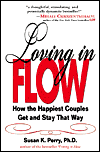
Image by prettysleepy1
"Communication" has become such a buzz word for what couples need to do that it's lost meaning. What you say and how you say it certainly matters, and I'll focus on ways to talk more effectively later. First, though, I want to emphasize that you can cut down on headache-causing strife using any number of strategies, most of which don't involve struggling for the right words.
Might some conflicts remain insoluble? Certainly many persistently tricky situations will never be solved as one or both of you would have preferred or could have predicted. But if you're open to creative solutions, you can stop fighting the same battles interminably. Stephen half-teases me: "The most revelatory insight for me has been that you can actually learn." So can we all.
What you'll read next is an idiosyncratic blend of methods used by couples who have learned how to curtail their wrangling.
CONCENTRATE ON THE CONNECTION
At the heart of many conflicts is the effort to control and change our partners, and that's because if they continue to act differently from us, we feel less connected to them. It can feel threatening to stretch that seemingly ephemeral thread that holds the two of us together. "The task for us is to learn to witness the flow," suggests psychologist Linda E. Olds. "We need to be able to be present at the whole array of feelings expressed by loved ones, including irritation and anger, without feeling responsible or guilty or even needing them to be different."
For an example of how this works in reality, consider Howard. At thirty-eight, he's been married just over ten years, with two preschoolers, and he says he and his wife have argued much less in the second five years of their marriage than in the first five.
"We're both very intense, in different ways," explains Howard, "and when we get wrapped up in an argument we both pursue it to illogical extremes. So whichever one of us realizes first that we're doing that, we'll back off and say something to the effect of, 'Hey, I'm on your side, we're making more out of this than there needs to be, there's a simple learning point here, let's focus on that and forget all this other stuff'. It's typically whoever consciously recognizes first that we're running down a rat hole, as we call it. We will go two weeks without any disharmony and then we'll have an intense argument that will last for forty-five minutes and then it's over."
REMEMBER YOUR PARTNER ISN'T YOUR PARENT
Have you ever said to your spouse, "You're just like my father"? Without a doubt, your reaction to him is colored by your past experience with a parent. Harder to recognize are the more subtle ways we distort our partners. In Couple Skills , authors Matthew McKay, Patrick Fanning, and Kim Paleg suggest being on the lookout for certain indicators that distortion is going on.
One of the most distinct is if you feel "a sudden rush of intense negative emotion in response to something your partner says or does." That emotion causes you to want to protect yourself out of proportion to the provocation. Or, when you experience a feeling in the present and it seems old and familiar, look for the possibility you're mixing up your partner with your parent, big brother, first wife, or other figure from your past.
Another time to be wary, suggest the authors, is when you assume you can read your partner's mind, because you may be assuming a reality that's based on a whole other person — your mother or father. Finally, if you fear you're going to be rejected by your partner every time you're in conflict, the fear could be a childhood echo from when you were rejected for speaking up.
DON'T AVOID CONFLICT
One of the reasons some partners may not always do what they say they're going to do is that they've agreed only in order to avoid conflict. If you're with someone who constantly fails to deliver on what's been promised, recognize that it may be a form of passive aggression. Rather than labeling that behavior, though, see if you can make conflict safer for both of you. A "no" should not garner an angry response if you want your partner to feel he or she has the freedom to be honest with you about their intentions. If you're the one who often fails to keep your word, imagine how frustrating that is to the other person and how it frays the trust between you. Is it conflict you're trying to avoid? What's the fear underlying the avoidance? Deal directly with that issue.
BE AN ANTHROPOLOGIST
Search out the pattern of your struggles. Psychologist Andrew Christensen suggests you describe rather than reenact. In other words, try to behave like a scientist and analyze your emotions with some detachment. Beware, though, of falling into that familiar and stereotypical pattern where one of you is always very detached (often, but not necessarily, the male). There is a rhyme and place for scientific detachment, which is not when one of you is weeping your heart out.
BE A WEATHERPERSON
Assess what else is going on in your lives that might be contributing to this particular clash. Do either of you feel emotionally exhausted at the start of a fight due to work pressures, children's demands, not enough sleep, or hormonal shifts? Trust each other's statements of your inner worlds. Deal with as many of those other stresses as possible first, rather than inflicting them on each other.
Create ways to get the space you need so you don't say or do anything you'll regret later. One husband admitted to me that to calm himself, he repeats the mantra, "She's having a hard time right now."
It has been found that having good self-control makes it much more likely that you'll be able to react constructively by brainstorming or trying to understand your partner's views — rather than by lashing out about past upsets. It's true, some folks are more self-controlled, but anyone's in-the-moment ability to self-regulate diminishes when inner resources are depleted by other stresses. It's the same process that makes it so infuriatingly difficult to stick to your eating or exercising resolutions when you're feeling overwhelmed in some area of your life: only so much self-control is available to you at one time.
Even in the best of partnerships, arguments are more likely when the stresses are multiple. One recent weekend, Susan Tyler Hitchcock was struggling with a lot of issues: "I was feeling a lot of grief over world events, and my son is in his senior year, which was making me really sad, and I had PMS. I started taking antidepressants and they haven't fully kicked in. When David sees me so upset about things, what I want him to do is say, 'Oh, Susan, I feel so bad to hear you say this and I'm going to change right away.' But he doesn't react that way." Nevertheless, even when she's most upset with him, herself, and the relationship, "what happens is I have such a down deep confidence that the relationship's going to last that I can say what I need to and I can go through the feelings."
Zoey and Josef, a Massachusetts couple married ten years with two school-aged daughters, both woke up snappish and grumpy one Saturday. In the past, those moods alone would have been ingredients, as Zoey puts it, "for a perfectly awful weekend of bickering and/or full-on fighting, all resulting in hurt feelings and lingering anger and resentment." Josef found a small ding on her car that she didn't remember causing, the kids were fighting, Zoey spilled some paint on the garage floor, but all-out war didn't result this time. Josef went so far as to allow that perhaps he caused the ding, and that garage floors are meant to get messy.
"At one point in the afternoon, right after he had gotten up from his nap, he started to harp on me about something and then stopped and said, `What's wrong with me? Let me go wake up and shake this off.' Flexible couples reframe bad days as a normal part of the cyclical process of marriage.
Over-regulating yourself, on the other hand, can backfire: pressure will build so that you may explode the next time.
Although indulging in every impulse won't help your relationship, do learn to recognize when you're becoming depleted so you can put your irritability on hold.
REMEMBER THE CHILDREN
Factor in the presence of children: it's been found that although marital spats take place twice as often when the kids aren't around, some of the most virulent, hostile, and destructive conflicts are carried on in front of the children. Psychologists guess that couples are least able to inhibit negative interactions when they're most distressed, with the unfortunate result that children don't often see adult problem-solving when it's being handled most constructively. This, then, is another good reason to become aware of your state of mind and not allow marital negativity to build to explosive levels.
TONE IT DOWN
Those who are able to lower their emotional arousal levels during stressful interactions have happier marriages. To develop the knack, try this: begin paying attention to your state of emotional arousal and rate it on a scale of one to ten. It doesn't have to be when you're upset with each other — any stress will do for practice, and joy is emotionally arousing too.
During conflict, are you feeling overwhelmed by intense emotion? Does your partner's reaction feel unexpected and as though it's coming out of nowhere? Do you wish you could escape from the interaction? That's called flooding. When this happens, it's time to take a break and soothe yourself (if not your partner). Eventually, you'll be able to bring your arousal down to manageable levels whenever something upsetting is going on.
Studies have found that some men tend to do this more readily than many women. It is why they tend to withdraw from conflict: to make themselves feel better. Others, more typically (but not always) women, stick with the distressing conversation and get highly charged but don't necessarily feel negatively about it.
It's easy to see that hostile, sarcastic, or threatening language would be off-putting to your partner, but simply raising your voice can also be threatening. You can also work together to become aware of each other's level of emotional arousal, learn to say what's happening for you, then seek a compromise so you can both feel okay and continue to talk, perhaps after a brief break.
Another way to tone it down is to try humor, but again without trivializing what's most important to either of you. In my previous marriage, my emotional outbursts were legendary: door slams that broke off chunks of plaster, screams I'm sure the neighbors heard. I find that Stephen and I seesaw in our emotional reactivity. He used to withdraw quickly from conflict in order to avoid the painful emotional charge. When I'd press and pursue — and raise my voice in frustration — he might erupt into a scary outburst. More recently, it's me who has to leave the room for a few minutes as I realize I've reached my emotional limit and I'm trying not to raise my voice.
TIMING MATTERS
Timing is more important than many of us realize until it's too late and we've gotten embroiled in some snippy tete-a-tete that could have been avoided. Do some of your conflicts occur at transition points in the day, such as when you're awakening, are arriving home from work, or are exhausted? Sit in your car a few moments. Plan ahead for a refreshing drink, a quick reconnection-in-passing, before you fully transition, and plan to reconnect more thoroughly later. Learn not to take your partner's transitional needs as a personal affront.
When I was in grad school (admittedly during a strained part of the marriage), it used to be extra hard to mesh our separate rhythms when I'd return from a distant conference. Whatever I'd be thinking about the whole way home would clash with what Stephen was doing when I got there. One memorable time I spent the two-hour drive listening to stimulating music and imagining jumping directly into bed with him in a freshly-cleaned house (this last bit was the greater fantasy, to be sure), and he was in the midst of last-moment vacuuming and not at all ready to get sexy. Rather than adapting to his mood, I felt hurt and angry and disappointed, and it took us a couple of days to feel reconnected.
SPACE MATTERS
Giving each other breathing room is a part of regulating your emotional arousal. Have the sense not to fight in the car, don't follow when your partner withdraws, listen when one of you says "I've about had it" (even if it's you who's saying it). Put your issues on hold, realizing that when one of you is about to expel steam from the nostrils and ears, this has to be respected. It's a primal thing and can't be talked away. Try choosing a phrase, something as simple as "time out," that indicates one of you needs some simmering-down time.
CHANGE THE ENVIRONMENT
When Stephen and I need to talk, we often move to the living room, which has come to be known as "the talking room." It's a comfortable, undistracting place to sit. We may even end up leaning on one another on the sofa when we get to a point where we're ready for a renewed physical as well as emotional connection.
USE LISTS WITH CAUTION
Some therapists suggest couples who feel distant from one another begin doing the loving behaviors their partners want, promising that the warm feelings will follow. One way to begin is for each of you to compile a list of specific caring behaviors you'd like your partner to try. Then don't miss small efforts made to please you. As is often suggested to parents about their children, catch 'em being good instead of always hollering when they're not. The problem is that, so often, one person makes a change that's barely noticed by the other partner, and then doesn't stick with it for long. If changes are made, they should stay made.
A long time ago, when we were mired in our most conflicted years, we came across a book by Doris Wild Helmering, called Happily Ever After: A Therapist's Guide to Taking the Fight Out & Putting the Fun Back into Your Marriage . Helmering lists lots of "Behaviors that make a difference," and at that time we each marked some. With hindsight, it's possible to tell which made a difference for us by examining those little marks and our memories. These are the few that Stephen marked: say thank you more often, give more compliments, be more affectionate, and approach him sexually. The items I marked included: tell her she's pretty, say "I love you," pick up after myself, make the time to do fun things together, cut down on drinking, bring her little surprises, do what I say I'm going to do.
Doing those things for each other, however, wasn't easy. Resentments kept getting in the way. What I'm saying here is that this type of list-making is a start to help you see what's upsetting each of you. But unless you get beneath the individual items to what they represent, you may end up no better than you started. And each time some self-help tip fails to work magic, you may get more discouraged.
IS IT ALREADY SOLVED?
Andrew Christensen and his co-author Neil S. Jacobson have observed that sometimes whatever you're doing about some problem, as weird as it might seem to another couple, is the solution, albeit imperfect. For example, the husband doesn't do enough parenting, the wife criticizes, and he tolerates her criticism. If he reacted nastily, the situation might escalate into a major fuss. The fact that she's able to relieve her frustration openly is a solution of sorts, so that the couple needn't constantly think of this as a problem. Is this a recommended attitude? Depends on the issue. Something as important as being an involved parent could be worth pursuing further, whereas if the conflict were over a less crucial matter, the non-solution solution could maintain the peace and allow good feelings to prevail regardless of the lack of full resolution.
PAY ATTENTION TO YOUR INNER VOICE
What we say to ourselves matters. If your self-talk is repetitively negative, you might succeed only in extending the hostilities. For instance, recently Stephen and I were taking a walk and found ourselves arguing with some vehemence. My flare of temper caused Stephen to claim I was getting scary, so I walked away to give both of us the space to calm down. As I walked, I spoke to myself, reiterating my case: "He's not fair, he just doesn't get it, he never thinks of my feelings," and so on. When you do this, you're not helping cool yourself down, and by not challenging such inaccurate and poisonous thoughts, you're allowing them to take a firmer hold. What's worse, I caught myself mumbling, "Hate, hate, hate." Which is not how I feel 99.999 percent of the time. I realized this wasn't productive, and that it would be best to think of something else until my boiling emotions could cool. Giving yourselves space away from each other is only helpful if you don't continue the emotional abuse in your head.
WATCH YOUR OVERHEATED WORDS
Some people spew very harsh words during fights. When the battle is over, they will say they didn't mean it, but the other party is convinced those words were indeed intended to hurt.
Marylis, who wished her husband Conrad would give her a hug instead of questioning her when she's hurt, admits that their angry emotions have mellowed as they've gotten older. "I can remember yelling fights on a monthly basis. Now, if it happens once a year, maybe twice, that would be more typical. It's true that we're both yellers, but we don't say things like, 'I'm out the door,' or something like that that we wouldn't be able to take back. I feel like when I'm emotional and can't control myself is when things go out of control. When one person's venting, it's so much fun to jump in there and vent yourself." Fun, perhaps, but certainly not helpful.
Think about the hot words you pronounce when you're angry. Calling someone a fat pig may never be forgiven or forgotten. Hurling accusatory judgments, such as "You're a loser," or "No one could love you," will leave indelible stains on your relationship. If such remarks do slip out, they often reflect some deep-seated resentment. Before the next rage overtakes either of you, face up to those hidden peeves.
If you say mean things in order to hurt, shame on you. Couples who've learned to love in flow do not fling statements intended to cause pain (which is not to say that no one ever gets hurt during conflict).
PICK YOUR BATTLES
"The biggest compromise I've made over the years is to learn how to choose my battles," says Mei-Ling, a thirty-seven year-old real estate agent who's been married twelve years. Although she says their conflicts are rarely about anything major, her husband Ramsey's critical tendencies bother her. The only time she makes an issue of it, though, is when he goes too far and pokes at her most sensitive emotional areas. Then she lets him know he's overstepped.
The "pick your battle" mantra can be misused, however. If too many petty annoyances seem to be accumulating, it's far better to confront them. They don't have to cause a battle. Be honest about why you're not going to continue hiding your discontentment. Perhaps you feel under appreciated or over-controlled. If you talk about those feelings as soon as you realize what's going on for you, you are more likely to get a fair hearing than if you let them build up until you're furious.
Harriet and Myron are a Florida couple in their sixties who have been married forty-five years. Harriet wishes she'd learned how to speak up many years earlier than she did. Her husband, Myron, now a retired doctor, used to be highly sarcastic until a therapist helped her realize that she was allowing him to get away with too much.
"He wouldn't dare do that now," says Harriet. "The therapist told me, 'You didn't even ring the doorbell twice.' Meaning: don't give up, be assertive, go after what you want, voice what you are feeling and thinking. When I first let Myron know my reaction to his sarcasm, he was stunned. If you don't tell people things, how can they ever know?"
One of JoBeth's consistent irritations with her husband is that he's only willing to help out around the house on his preferred time schedule. Recently a pair of eight-foot-long fluorescent bulbs in the basement needed replacing, and she asked for help a few times. Suddenly her husband decided now was the time, regardless of the fact that JoBeth was immersed in another task. You can fight these incompatible styles endlessly, casting subtle accusations of insensitivity, or else decide how important it is to get the job done — and join in gracefully.
STICK TO THE POINT
Try not to bring every other annoyance in your life to the table when you're embroiled over a particular issue. And if your partner says, "That's another subject, let's stick to this for now," accept that. Even if you think what you're bringing up is related, leave it for another time if it feels off-track to one of you. See if your partner will agree to set a time to talk about the other issue, if that will help you put it aside for now, but don't insist.
NEGOTIATE CREATIVELY
One couple reports that rather than ever compromising when there's a decision to be made, such as whether or not to visit a relative, make a purchase, where to eat or what movie to see, they determine to whom it is most important. For this to work, you have to trust that the other person is telling the truth about what's crucial and what isn't. And if you're with someone for whom everything is of number one importance, while anything you want is seen as not that important, this system might not be the best.
CHANGE THE MEDIUM
Another way to avoid becoming entangled in a frustrating cycle is to write your partner an email message or a letter. That way you have a chance to plan your words before sending them, and there's time to reflect before responding. Fringe benefit: you can't interrupt each other.
BE FUTURE-ORIENTED
It is pointless to spend a lot of time arguing over what one or both of you ought to have done, unless it's in the service of preventing the same alleged misbehavior in the future. Once you reach the point of irreconcilable views over what did happen, stop the bickering and ask each other, "What might we do to ensure this type of conflict doesn't happen again?"
SAVE FACE
Consider when it might be sensible to let a conflict wind down without an overt apology on anyone's part and without necessarily agreeing on specific action for the future. At times, change will occur, restitution will be made, without anyone having to put their remorse into words. In the process of batting around your various disgruntlements, you will each have heard the other, even if neither of you wish to go on record. Or one of you might have a particularly hard time expressing apologies, no matter how bad you feel. If this describes your partner, be kind and allow him to save face. Perhaps his actions will speak up though his voice holds back.
PUT IT INTO PERSPECTIVE
One simple exercise always works for me: when I'm exceptionally angry, I picture myself attempting to divide our commingled belongings so we can separate. It doesn't take long for me to realize what I'd miss about him, what I'd regret, and how trivial this particular conflict is in the face of such dramatic (even melodramatic) thoughts.
REFRAME
Practice not reacting in identical ways to the same old provocations. Your husband has once again misplaced a vital receipt, making your job of tax prep impossible to do efficiently. Can you still harbor warm or at least neutral feelings about him? Or as psychiatrist Peter D. Kramer describes it, "To be committed is to be able to find the receipts a mess and be perfectly fine — still aware of [your partner] in all her aspects. Or, when [he] asks where the tickets are, not to feel that all the air has been sucked out of the room. Though perhaps, as in skiing, it is better to begin somewhere less challenging, to 'drop back a level.' Could you look at an uncapped soda bottle, or cap one, without feeling violated?"
It is most healthy if you're able to accept that your partner is different from you, without taking it personally or catastrophically. But some couples make judgements of who's right and who's wrong all the time — a product of their families and their cultures that see things in only one way and can't grasp how we construct our realities depending on our unique experiences. As a character in the Patrick O'Leary novel Door Number Three says, "I watched her towel herself dry, thinking how myopic we are about the rituals we adopt. We think everyone does it our way. I would never rest my leg on the side of the tub to dry it, as Nancy did. But then, I would never make an issue of it, as if there were a right way."
REPAIR
When in the midst of a battle, try to remember that it isn't conflict resolution at all that ensures marital success. Much more important is the way repairs are made when things fall temporarily apart, says psychologist John Gottman. If your marital friendship is strong, you'll be able to keep negative moments between you from growing into something larger and more damaging.
Liberating, isn't it? You can fight imperfectly so long as you patch up the relationship excellently. That seems to be what occurs most often in the relationships I studied, and in my own. We have dopey and trivial disagreements that sometimes turn into momentary alienations — though we're careful not to demean each other or say nasty things we'd never be able to take back. Then we calm down and reconnect.
Reprinted with permission of the publisher,
Sourebooks, Inc. ©2003. www.sourcebooks.com
Article Source:
Loving in Flow: How the Happiest Couples Get and Stay That Way
by Susan K. Perry.
 Based upon the concept of Flow, Mihaly Csikszentmihalyi's international bestseller, Loving in Flow combines the author's own experiences with studies of dozens of unusually happy long-term and married couples to discuss how compromise and communication, and being "in flow," are the keys to building solid and long-lasting relationships. Perry uses interviews and recent research to discuss every aspect of a relationship, from the initial meeting through childbearing and beyond.
Based upon the concept of Flow, Mihaly Csikszentmihalyi's international bestseller, Loving in Flow combines the author's own experiences with studies of dozens of unusually happy long-term and married couples to discuss how compromise and communication, and being "in flow," are the keys to building solid and long-lasting relationships. Perry uses interviews and recent research to discuss every aspect of a relationship, from the initial meeting through childbearing and beyond.
Click here for more info and/or to order this book.
About the Author
 Susan K. Perry, Ph.D., is a social psychologist with a special interest in positive psychology. She is the best selling author of numerous books and the award-winning writer of more than 800 articles, essays, and advice columns. Her most recent books include Writing in Flow: Keys to Enhanced Creativity: Playing Smart: The Family Guide to Enriching, Offbeat Learning Activities; and Catch the Spirit: Teen Volunteers Tell How They Made a Difference. Visit her website at: www.bunnyape.com
Susan K. Perry, Ph.D., is a social psychologist with a special interest in positive psychology. She is the best selling author of numerous books and the award-winning writer of more than 800 articles, essays, and advice columns. Her most recent books include Writing in Flow: Keys to Enhanced Creativity: Playing Smart: The Family Guide to Enriching, Offbeat Learning Activities; and Catch the Spirit: Teen Volunteers Tell How They Made a Difference. Visit her website at: www.bunnyape.com

























